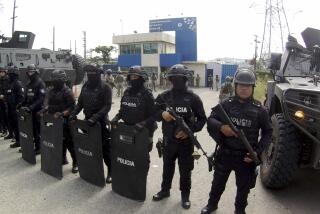Nature of the Job Endangers Diplomats
- Share via
WASHINGTON — Although they work in embassies fortified against terrorist threats, thousands of U.S. diplomats across the globe live in homes where they are as vulnerable to attack as Laurence Foley, the USAID official gunned down Monday in Amman, Jordan.
Foley’s slaying prompted a call from the American Foreign Service Assn. for the government to step up efforts to protect diplomats and their families.
“The threat used to be inside our offices. Now it’s wherever we gather,” said John K. Naland, president of the association. He said terrorists seem more willing to kill family members as well as U.S. government employees, as they did in March in an attack on a church in Pakistan, where a diplomat’s wife and her daughter were killed.
The association called for the State Department to expand security to areas farther from embassies and to try to protect family members as well as the embassy staff. It also called for the government to speed up work on security improvements at U.S. Agency for International Development facilities abroad. The upgrades have been requested by the department but are hung up in Congress.
State Department officials declined comment on the proposals, but one official said the department had been “working very hard” on improving residential security.
The U.S. State Department has poured more than $4 billion into rebuilding embassies and taking other steps to improve diplomatic security since two U.S. embassies in East Africa were bombed in August 1998. But terrorists appear to be increasingly going after “softer” targets. Earlier this month, a night club on the Indonesian island of Bali was bombed.
A U.S. intelligence official said that while it was unclear whether the attack on Foley was terrorism, “it doesn’t look like a robbery.” Another U.S. official said Foley was not a CIA employee.
The last killing of a U.S. diplomat in Jordan was in 1970, when Palestinian gunmen shot Maj. Robert Perry, an assistant military attache, at his home. The assassination came during a period of heavy fighting between the Palestine Liberation Organization and Jordanian troops.
With its stable, pro-Western regime and well-developed security apparatus, Jordan has generally been considered a relatively safe Arab state for U.S. diplomats and businessmen. One U.S. official, an expert on the Middle East, said it was especially alarming that the killing had taken place in Jordan.
“It’s very alarming. Jordan is known as a safe place,” the official said. “I have been with ambassadors in that part of the world who were just totally exposed because it’s always been such a friendly environment to us. There’s no history that would condition us to take extra precautions there.”
U.S. officials say they are considering how to extend protection for the 9,500 U.S. diplomats living beyond embassy walls around the world. One option being explored, they said, is to step up protection at homes.
But officials acknowledge that cost is an issue, and that there cannot be 100% protection when part of a diplomat’s job is to have wide contact with the people of the host nation.
State Department spokesman Richard Boucher said that the government has “done a lot in upgrading security at our embassies ... and for some of our residences. But all over the world, we’ve seen this terrible practice that, when we are able to better protect ‘hard’ targets ... then they go looking for other things.”
Under current rules, new embassies and consulates are set back from the street 100 feet to protect them from car bombs and are surrounded by perimeter walls and concrete barricades. In some cities, embassy employees live in compounds or buildings with guards. Sometimes they travel in cars with 3-inch-thick bulletproof windows.
The State Department has an aggressive surveillance program around U.S. government buildings and has increased its security staff more than 50%.
Because of security risks, the State Department has moved family members and nonessential employees out of Pakistan, Indonesia and Yemen. In some places, such as Jerusalem, the department has declared large swaths of a city off limits.
*
Staff writer Greg Miller contributed to this story.
More to Read
Sign up for Essential California
The most important California stories and recommendations in your inbox every morning.
You may occasionally receive promotional content from the Los Angeles Times.











